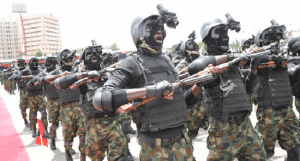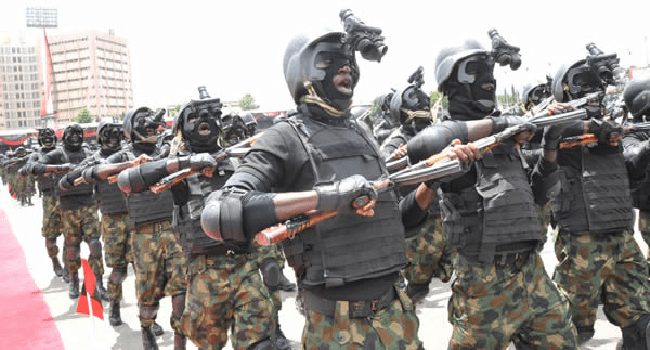
The training was part of measures to ensure strict compliance to rules of engagement and respect for human rights.
Some security operatives at the training concluded on Saturday at the Nigerian Army Peacekeeping Centre, Jaji, Kaduna State, were drawn from the Nigerian Army, Nigeria Police Force, Nigerian Air Force and the Department of State Security Service across the country.
At the end of the exercise, the commandant of the centre, Brigadier General Adamu Dauda, said the training had exposed security operatives to international best practices on how to maintain a cordial relationship with the civilian populace during war or peacekeeping operations.
Respect For Human Rights
He stated that the training was expected to further boost the capacity of men of the armed forces and other security agencies to institutionalise the respect for human rights and civil-military relationship framework while discharging their constitutional duties.
In an ideal situation the military is a highly regimented and professional service that confines those who serve from barracks, bases, and formations, among others to the war zones or conflict areas.
The military’s primary goal is to defend the nation’s territorial integrity and suppress internal insurrection.
However, the changing nature of conflicts occasioned by global terrorism, non-state actor-led asymmetric warfare embedded within the civil populace has blurred these traditional lines.
With increasing threat of terrorism and inability of the police to deal with such challenges, the military has to be drafted into an unfamiliar territory of managing civil unrest with its inherent anomalies.
This development, which is worrisome to the Office of the National Security Adviser in partnership with the European Union made the training necessary.
A European Union Attaché, Marc Humbert, represented the EU at the training.
On the field, the participants demonstrated what they had learnt. Search and rescue operations without recording much casualty, civil-military affairs, media relations, command and leadership, among other skills were displayed.
The Commandant of the Peacekeeping Centre said the field exercise was the climax of weeks of intensive training for the troops to showcase what they had learnt.
The training instructor said the training had largely improved the capacity of the participants to discharge their duties effectively.
Over 100 security personnel participated in the training.
It is expected that at the end of the day, they would go back to their various formations and battalions and retrain their colleagues on what they have learnt from the centre.

